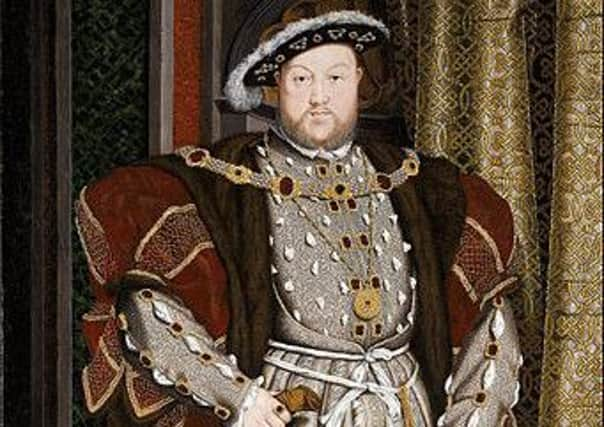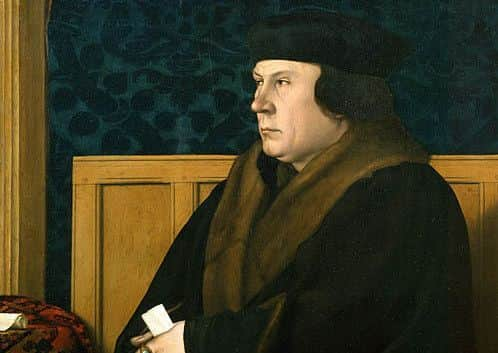When Whitburn fishermen plotted to overthrow the king


But he wasn’t just any old chap, as historian Douglas Smith explains, he was the king of England – Henry VIII.
This fascinating chapter in our history was unearthed in a letter, as Douglas reveals.


Advertisement
Hide AdAdvertisement
Hide Ad“Details were buried in a letter deep within the 21 hefty volumes familiar to historians as the State Papers Foreign and Domestic of Henry VIII,” he says.
“It was the day the fishermen of Whitburn begged a Scottish king to rid them of the English king – a man they blamed for many of the miseries of life in a small fishing village.”
The plea for help followed a revolt in 1536, known as the Pilgrimage of Grace, against several royal enactments, principally the dissolution of great monasteries and abbeys.
Much blame was popularly placed on Thomas Cromwell, chief minister to Henry VIII, who was “the cause of all our miseries and heresies” – according to those behind the rebellion.


Advertisement
Hide AdAdvertisement
Hide Ad“A rebel army of thousands marched under the leadership of Yorkshireman John Aske, to demand an end to the destruction,” said Douglas, president of Sunderland Antiquarian Society.
“Aske was encouraged to meet the king, with an assurance of safe conduct.
“But Henry, being fearful and furious, reneged on his promise and had Aske and his followers hanged.
“The revolt was then put down with great cruelty.”
In the meantime, James V, the King of Scotland, had travelled to France to wed Madeleine, daughter of the French monarch, who was a lady of rather delicate health.
Advertisement
Hide AdAdvertisement
Hide AdJames had hoped to return home to Scotland overland with his bride, due to her frailty, but Henry refused the request – seeing his popular nephew as a potential rival to the throne.
“The pair were forced to wait several months until it was calm enough to sail.
“But, after dropping anchor at Scarborough on the way, they were surprised by visitors,” said Douglas.
“A dozen men pulled alongside in a fishing boat, and asked to speak to the king. James was no doubt astonished when they implored him to invade, saying they were sorely oppressed.”
Advertisement
Hide AdAdvertisement
Hide AdTaken aback by the demand, James refused, and gave orders for the Royal fleet to continue north. He was, after all, eager to take his bride home to Scotland.
But, when his ship later dropped anchor off the coast of Whitburn, yet another boatload of fishermen pulled alongside – this time accompanied by a priest called Robert Hodge.
“It is possible that James’s staff had planned to seek fish and fresh victuals for the remainder of their journey, but the fishermen arrived before provisions could be sought,” said Douglas.
“Again, the men begged James to invade England to deliver them from ‘serial killer’ Henry.
Advertisement
Hide AdAdvertisement
Hide Ad“This time, a party of French and Scots agreed to come ashore, probably in search of food.”
One of this party was an Englishman in French service, called James Crane.
“Unknown to the fishermen of Whitburn, and King James, Crane was one of Cromwell’s spies.”
Once ashore, as the crew searched for fresh provisions, Crane seized the opportunity to question Robert Hodge (who was believed to have been the curate of Whitburn parish) at length.
Advertisement
Hide AdAdvertisement
Hide AdUnsuspecting, and obviously trusting a man he believed was loyal to the Scottish King, Hodge was more than ready to pour out the grievances of northern folk to crafty Crane.
And he especially blamed Crowmwell, as well as the Duke of Norfolk – who had been made personally responsible for the execution of the rebels – for most of life’s daily woes.
“What news on England?” queried Crane.
“Ill news, for they kill and hang the men in the country,” replied Hodge, which was a reference to the reprisals taken against the Yorkshire rebels.”
Then, after being asked if he knew where Norfolk was, Hodge gave two possible ideas, before adding that he “wished him hanged on one side of a tree and Cromwell on the other”.
“These were treasonable words,” says Douglas.
Advertisement
Hide AdAdvertisement
Hide Ad“And ones that Crane no doubt was careful to take note of, especially as Hodge added he would have supported an invasion by James.”
“As they talked, Hodge suddenly swept his gaze over Whitburn and Roker beaches, pointing out ‘Lo! Here is as good and as ready landing for men as any place in England!’”
Douglas concludes his fascinating account in tomorrow’s page.